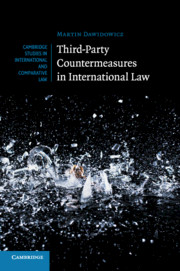Book contents
- Frontmatter
- Contents
- Foreword
- Preface
- Table of Cases
- List of Abbreviations
- 1 Introduction
- 2 Third-Party Countermeasures and the ICJ
- 3 Third-Party Countermeasures in the ILC
- 4 Third-Party Countermeasures in State Practice
- 5 Permissibility of Third-Party Countermeasures: Evaluation
- 6 Third-Party Countermeasures and Safeguards against Abuse
- Conclusion
- Bibliography
- Index
- Miscellaneous Endmatter
Conclusion
Published online by Cambridge University Press: 01 June 2017
- Frontmatter
- Contents
- Foreword
- Preface
- Table of Cases
- List of Abbreviations
- 1 Introduction
- 2 Third-Party Countermeasures and the ICJ
- 3 Third-Party Countermeasures in the ILC
- 4 Third-Party Countermeasures in State Practice
- 5 Permissibility of Third-Party Countermeasures: Evaluation
- 6 Third-Party Countermeasures and Safeguards against Abuse
- Conclusion
- Bibliography
- Index
- Miscellaneous Endmatter
Summary
This study has examined modern practice at length in order to answer the question of whether States are entitled to take third-party countermeasures under contemporary international law and, if so, whether there are adequate safeguards against abuse. I hope to have demonstrated that there is strong support for an affirmative answer. Still, for the reasons identified at the outset, the question is a difficult and extremely controversial one.
The light which history shines on the topic is a lantern on the stern that continues to colour the whole approach to it – and perhaps understandably so. After all, the topic of third-party countermeasures raises a serious normative dilemma. There is an inherent tension between the need for a more effective legal order in spite of decentralization, and the risks of abuse relating to the allocation of enforcement authority to individual States, even if limited to the most serious illegalities. There is no point in repeating the conclusions reached in earlier chapters with respect to the position of third-party countermeasures in international law. All that remains is to briefly comment on what light practice sheds on the main normative arguments raised in the fraught debate on third-party countermeasures.
Two points merit particular attention with respect to the risk of abuse. First, there was concern in the Sixth Committee that third-party countermeasures were ‘open to abuse by powerful States against a weaker State that they might particularly dislike for other reasons’. Several target States have protested that the adoption of third-party countermeasures against them – supposedly ‘in the name of certain noble doctrines or ideals’ – is merely a thinly veiled ‘political tool’ based on ‘trumped-up claims’ and ‘unavowed objectives’. Practice shows that States have used third-party countermeasures cautiously: they have not been used for ulterior motives on the pretext that human rights or other communitarian norms must be respected. In particular, the fear that third-party countermeasures might facilitate ‘the exploitation and distortion of human rights issues as a means of interference in the internal affairs of States’ has not materialized.
- Type
- Chapter
- Information
- Third-Party Countermeasures in International Law , pp. 383 - 385Publisher: Cambridge University PressPrint publication year: 2017



